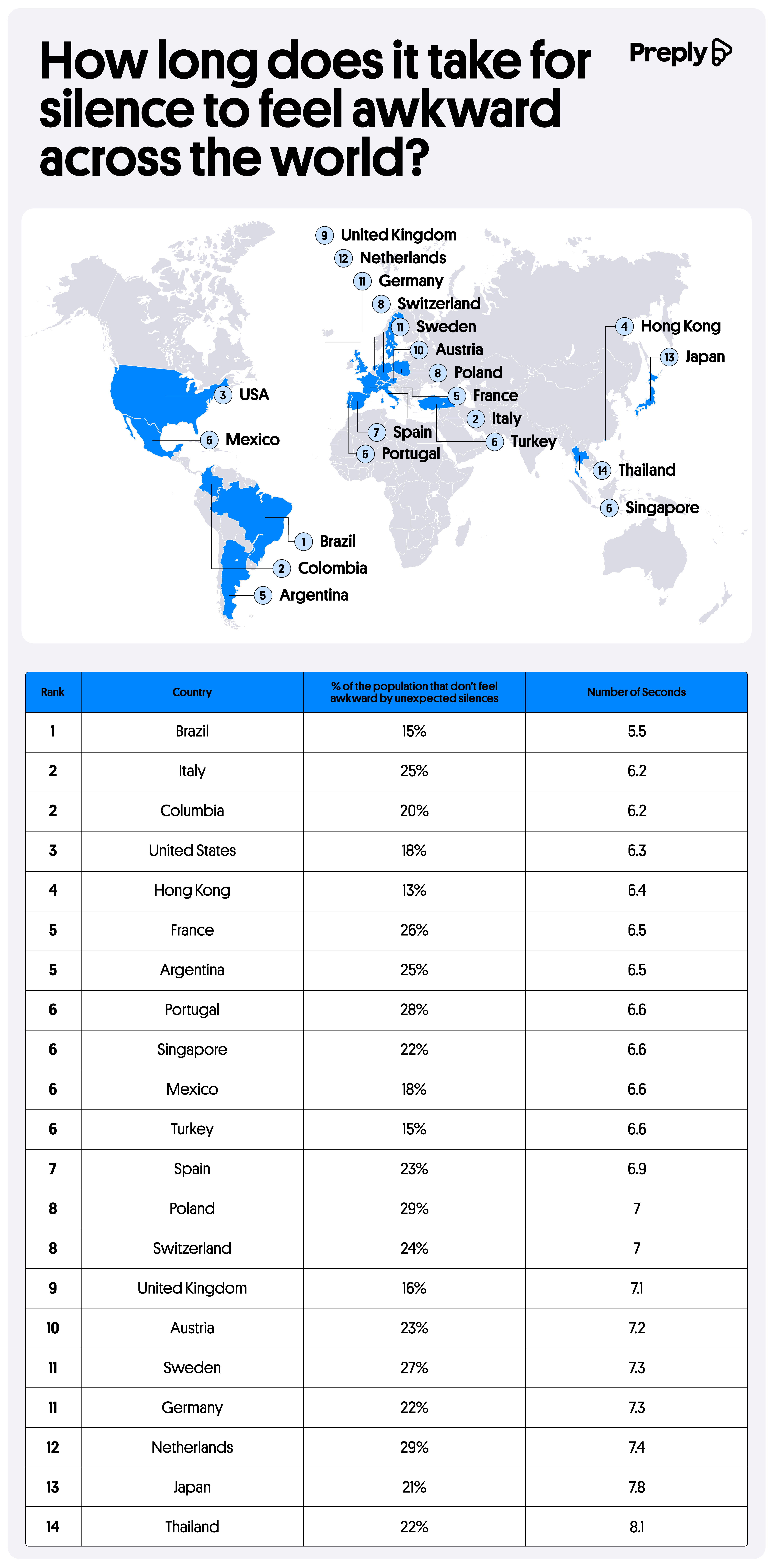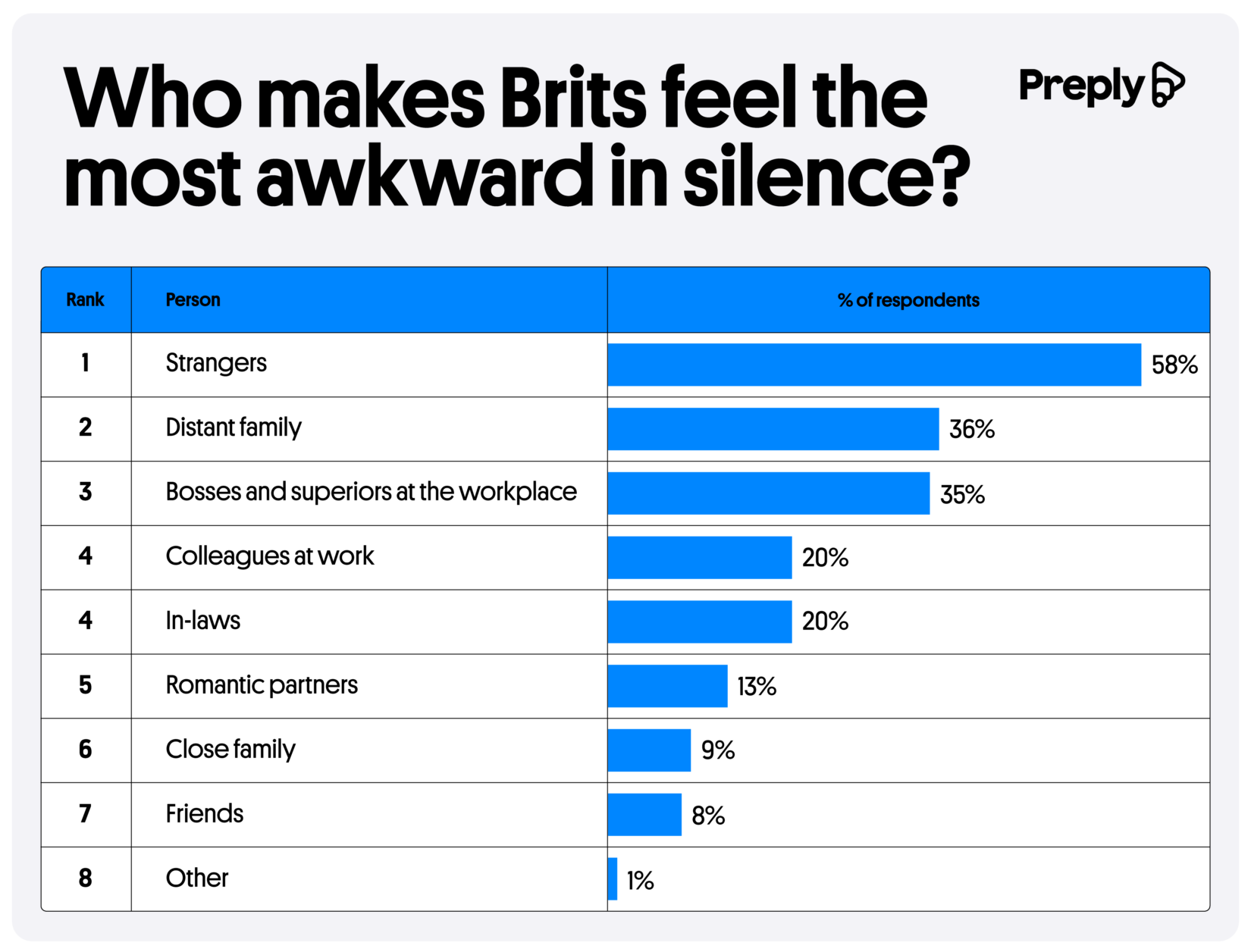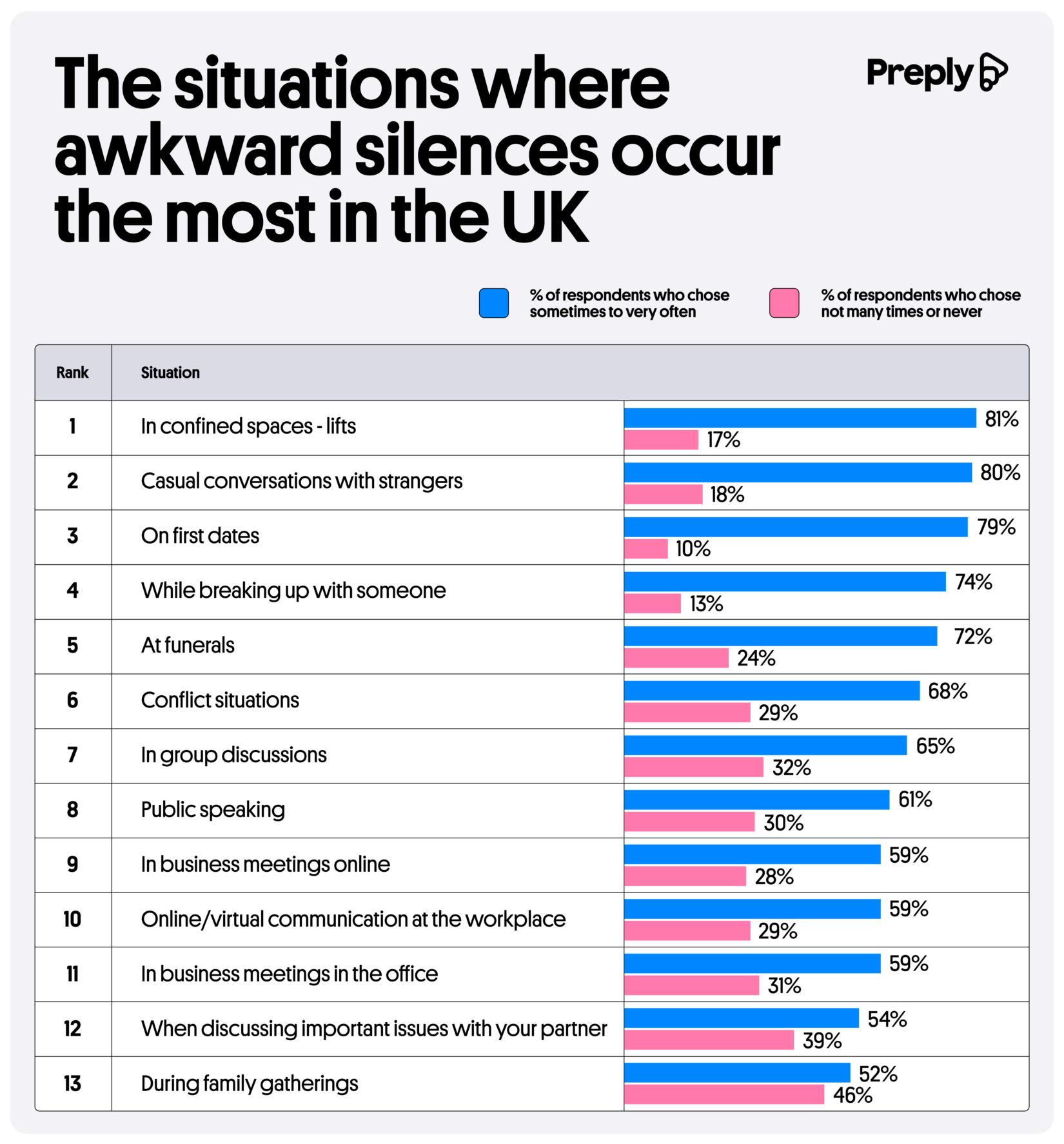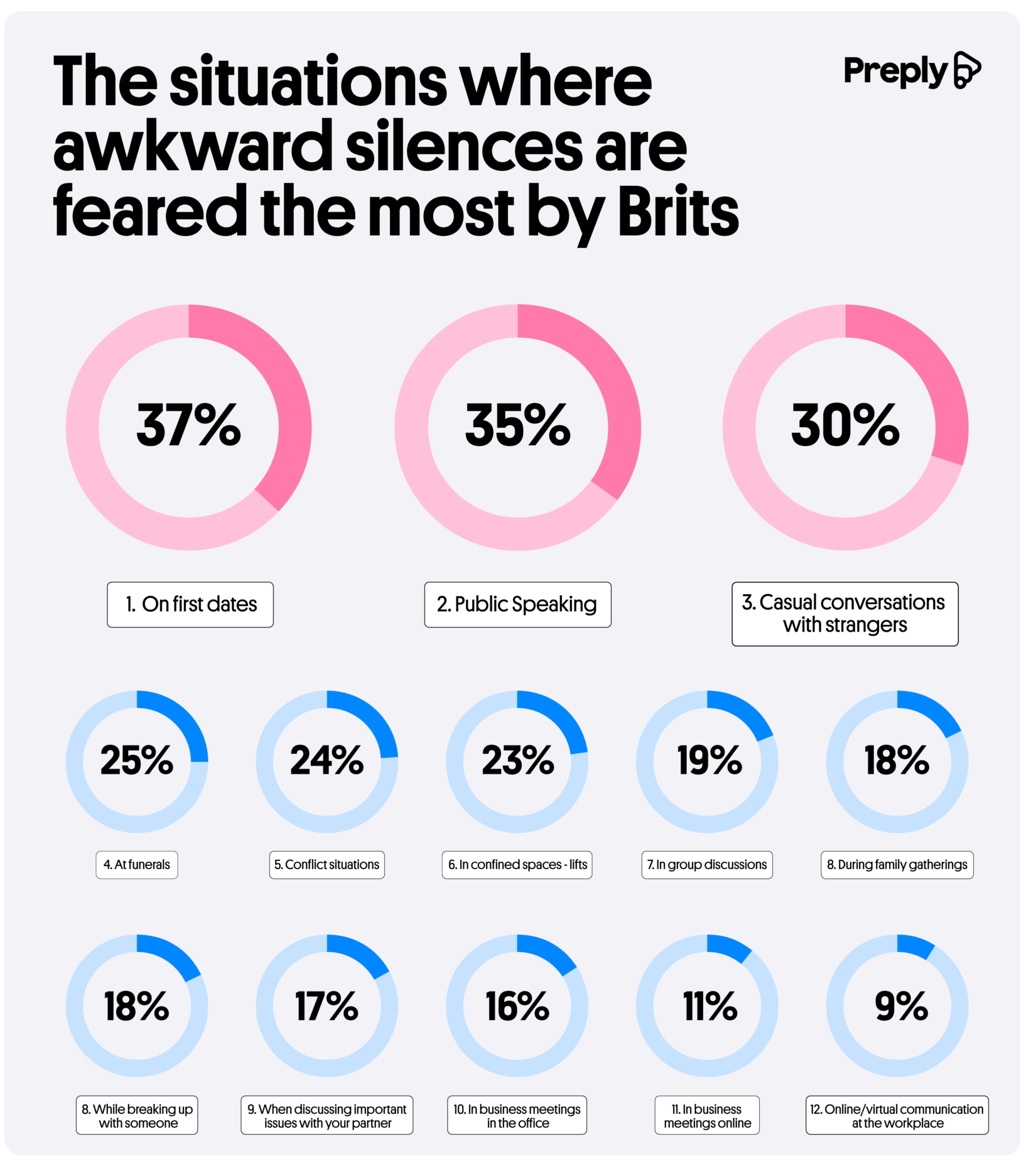We’ve all been there: the room falls silent, the dialog stalls and abruptly the air feels heavy with unease. Awkward silences have a peculiar energy to unnerve us, and for a nation famend for its politeness, Brits typically really feel an acute stress to fill the void. However why do these quiet moments really feel so uncomfortable? And is that this phenomenon uniquely British or does it resonate globally?
To search out out, we now have carried out a survey spanning 21 international locations to discover how lengthy it takes individuals around the globe to really feel uncomfortable in silence. We additionally delved into the eventualities Brits most difficult for these conversational lulls.
At Preply, as a supplier of on-line English lessons and lots of different languages, we’re keen about exploring all points of communication – together with these uncomfortable silences that appear to convey extra stress than phrases. Understanding the dynamics of those awkward pauses aligns with our mission to assist individuals talk extra successfully throughout languages and cultures.
Key findings
- The common individual finds silence awkward after 6.8 seconds, nonetheless, Brits say they will wait 7.1 seconds earlier than feeling pressured to talk.
- Sudden silences inside confined areas, resembling lifts, are the most probably to make Brits squirm.
- Awkward silences on first dates are probably the most dreaded amongst Brits, with 37% saying they concern this pause in dialog probably the most.
How lengthy does it take for silence to really feel awkward internationally?
Cultural variations form the way in which individuals reply to extended durations of silence. In lots of Asian cultures, silence is seen to be well mannered —an indication of attentiveness and considerate consideration of what the opposite individual is saying. In distinction, Western cultures typically understand silence as uncomfortable, prompting individuals to actively fill these gaps.
Regardless of this, it’s human nature to start feeling uneasy when silence stretches on for too lengthy. On common, this tipping level appears to happen round 6.8 seconds.

Our analysis reveals that Brazilians are the least comfy with sudden silences, with a placing 85% admitting they discover them awkward. In addition they have the shortest threshold for discomfort, saying that they might start to squirm after simply 5.5 seconds. This highlights Brazil’s cultural choice for energetic and steady conversations.
On the flip facet, residents of the Netherlands, Japan, and Thailand are among the many least more likely to discover silence uncomfortable. In these cultures, silence is commonly seen as a considerate gesture somewhat than a clumsy break in dialog. Folks in Thailand can endure the longest interval of silence with out feeling uncomfortable, suggesting they may final 8.1 seconds with out feeling the necessity to communicate – 1.3 seconds longer than the worldwide common. Within the Netherlands, practically a 3rd of individuals reported that they don’t discover silence uncomfortable in any respect, reflecting a cultural acceptance of quiet moments in dialog.
For individuals who really feel notably uneasy throughout silences, immersing your self in a language and tradition the place quiet moments are extra normalized might assist ease this discomfort. As an example, on-line Japanese lessons supply not solely language abilities but additionally insights into Japan’s cultural appreciation for pauses as an indication of reflection and respect.
The UK ranks ninth for discomfort with sudden silences. Typically, Brits discover silence notably awkward, with solely 16% of the inhabitants feeling unaffected by extended pauses. Youthful generations are likely to really feel this discomfort extra intensely; 92% of Gen Z say they discover extended silences awkward, in comparison with simply 75% of Boomers. The generational divide might stem from youthful individuals’s heightened concern with how others view them – a stress that appears to ease with age. Regardless of their sensitivity, Brits report a barely greater tolerance for silence than another nations, taking a median of seven.1 seconds earlier than the silence turns into agonising.
Who makes Brits really feel probably the most awkward in silence?
All of us have these particular individuals with whom we will sit in silence for hours, feeling fully comfy. Nevertheless, this dynamic isn’t the identical with strangers. For greater than half of the UK inhabitants, interactions with unfamiliar faces are the place awkward silences really feel probably the most uncomfortable.

By definition, a stranger is somebody we all know little to nothing about, which can clarify why awkward silences really feel notably uncomfortable of their presence. When a buddy is silent throughout a dialog, we regularly interpret it as an indication of attentive listening or considerate consideration. In distinction, with strangers, the shortage of familiarity can lead us to understand silence as an indication of judgement or lack of connection. Moreover, the absence of shared experiences or frequent pursuits makes it tougher to consider matters to fill the void. It’s no shock, then, that 58% of Brits report discovering silences with strangers extra awkward than with anybody else.
Sudden silences with distant members of the family additionally make over a 3rd of Brits (36%) uncomfortable. This discomfort seemingly stems from an identical lack of familiarity, making it difficult to reignite stalled conversations. That is notably pronounced amongst these aged 65 and over, with 65% of them feeling probably the most awkward throughout silent moments with prolonged household.
Within the office, awkward silences are worsened when they’re with superiors versus colleagues. Whereas just one in 5 workers discover silence with colleagues awkward, this determine rises to at least one in three when the silence happens with a boss.
Apparently, gender variations additionally appear to form how silences are perceived. Males are extra seemingly than girls to really feel awkward throughout silence with these near them. As an example, 15% of males discover extended silences with their important different uncomfortable, in comparison with simply 11% of girls. Equally, 10% of males report feeling the necessity to fill in silences with pals, whereas solely 7% of girls share this sentiment.
The conditions the place awkward silences happen probably the most within the UK

Have you ever ever discovered your self slowly ascending in a carry, desperately making an attempt to keep away from eye contact with everybody round you, and eagerly darting out at your flooring to flee the suffocating silence? If that’s the case, you’re not alone. A placing 81% of individuals admit they really feel uncomfortable with silence in these conditions, making the situation the place silence is perceived probably the most painful.
Given that folks discover silence notably uncomfortable within the presence of strangers, it’s not shocking that informal conversations with unfamiliar faces rank second for awkwardness. 4 out of 5 individuals report that they battle with these pauses.
Then there may be the silence on a primary date – a scenario many people know all too properly. Sitting throughout from somebody, trying to find the appropriate phrases to say, and watching the dialog falter could be painfully awkward. The stress to keep up a clean, participating dialogue is very excessive as silence could also be interpreted as an absence of chemistry, doubtlessly dampening the probabilities of a second date. Solely 10% of individuals within the UK say that they wouldn’t discover these eventualities awkward.
The conditions the place awkward silences are feared probably the most by Brits

The dreaded first-date silence takes the highest spot as probably the most feared situation for awkward silences. Though it ranks third total amongst conditions individuals think about most awkward for a pause to happen, 37% of people say it’s their biggest concern in the case of uncomfortable lulls in dialog. This anxiousness is especially pronounced amongst males, with 40% figuring out first-date silences as their high concern, in comparison with 33% of girls.
Awkward silences throughout public talking are available second, filling 35% of Brits with dread. Whereas seasoned audio system typically emphasize the ability of intentional pauses to present audiences time to mirror, unintended silences can really feel far much less efficient – particularly when all eyes are on you. The stress of being within the highlight with nothing to say solely amplifies the discomfort, making this a universally nerve-wracking expertise.
Are awkward silences a common human expertise?
Our analysis reveals that awkward silences are a common human expertise, although our tolerance for them is formed by tradition, context, and private variations. Whereas individuals within the UK could also be notably delicate to extended pauses, they’re removed from alone of their discomfort.
Yolanda Del Peso Ramos from Preply suggests, “Some languages rely extra on filler phrases to bridge gaps in dialog and keep away from awkward silences. Studying one among these, resembling by means of on-line German lessons or Spanish lessons, might improve your means to fill in a few of these pauses. Moreover, studying a brand new language may also help you keep away from uncomfortable silences when participating with individuals who don’t share your first language.”
Methodology
A survey of 26,719 individuals was carried out throughout 21 totally different international locations (Argentina, Austria, Brazil, Columbia, France, Germany, Hong Kong, Italy, Japan, Mexico, Netherlands, Poland ,Portugal, Singapore, Spain, Sweden, Switzerland, Thailand, Turkey, United Kingdom and the USA.) in November 2024.